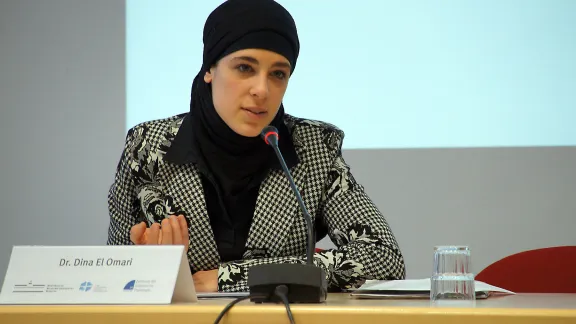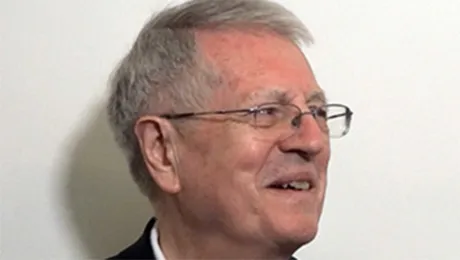
Dr. Dina El-Omari, Centre for Islamic Theology (ZIT) Münster, gives a welcome address at the Christian-Muslim consultation
First Cooperation between the LWF and a University Institute for Islamic Theology
(LWI) – A Christian-Muslim consultation on the role of faith in the public sphere marks the start of collaboration between The Lutheran World Federation (LWF) and an institute for Islamic theology. The conference which took place in Münster, Germany, from 9 to 12 January 2014, was jointly organized by the LWF Department for Theology and Public Witness and the Centre for Islamic Theology (Zentrum für Islamische Theologie, ZIT) in Münster (Germany).
“The collaboration between the Centre for Islamic Theology and The Lutheran World Federation in Geneva demonstrates that we do not engage in dialogue about each other but with each other. This constructive cooperation is evidence of our important contribution to religions’ active participation in pluralistic societies,” emphasized Professor Mouhanad Khorchide, director of the ZIT.
Intellectual and Emotional Acceptance
In the consultation, speakers from 15 different countries shared their analyses of the role of religions in society and jointly discussed understandings of the “public sphere” from faith-based perspectives. The consultation was interreligious and interdisciplinary, Christian and Muslim theologians, as well scholars from social, political and legal sciences contributed to the conversations. During the consultation there were lively discussions on how to ensure equal citizenship in religiously plural societies and in the face of many asymmetries between religious communities.
In her keynote lecture, the Muslim Professor Mona Siddiqui from the University of Edinburgh looked at the religiously plural societies and argued: “It is about understanding that if diversity in all manners is truly God’s will and blessing on earth, it must be accepted intellectually as well as emotionally in real terms.” She added: “This kind of commitment to diversity must make theological and political space for other ways of living and being whatever the differences.”
Seeking a Language of Hope
Bishop Dr Antje Jackelén, Archbishop-elect of Uppsala, Sweden, emphasized that theology has an important public role to play in society. “This is both possible and necessary.” She described that since its beginning, Christian theology has been in dialogue with secular knowledge in society. In unfolding the meaning of 1 Peter 3:15, she argued for a “theology that in light of the public seeks a language that can motivate and nourish hope. This does not happen by means of a theology that is absolute. It takes a theology that is resolute in its critical and self-critical reflection.”
The Center for Islamic Theology in Münster was established two years ago in response to the need for training Muslim religious education teachers. Germany is a secular state that in its constitution, guarantees religious education in state schools and allows for faith-based theological faculties in state universities. In order to implement the positive neutrality that the state claims towards religious communities, Muslim religious education has been introduced in some federal states in Germany. “Competent academic research on Islam promoting young Muslim researchers makes a vital contribution to the integration and equality of Muslim life in Germany,” said Dr Dina El Omari, researcher at the ZIT and co-organizer of the consultation.


